ENCOURAGING ILLOCUTIONARY SPEECH ACTS IN THE SONG LYRICS OF THE GREATEST SHOWMAN MOVIE BY MICHAEL GRACEY
Abstract
The lyrics of a song are not just a collection of beautiful words; they also serve as a form of communication that can carry pragmatic meanings, including speech acts that encourage. This research aims to identify and analyze illocutionary acts with encouraging functions in the lyrics of the movie The Greatest Showman. The encouraging function is understood as a type of utterance that offers support, enthusiasm, and motivation to the interlocutor or listener. This study employs a descriptive qualitative approach, using the speech act theory from Searle (1970) and Searle & Vanderveken (1985) as the basis for classification. The classification includes five types of speech acts: assertive, directive, commissive, expressive, and declarative. The data consist of lyrics collected from nine songs in the film, analyzed in the context of speech events, propositional content, and the effects of the utterances. The results indicate that the encouraging function in the song lyrics can manifest through various types of speech acts, not only in the form of explicit invitations but also through personal statements, commitments, and emotional expressions. Thus, the song lyrics in this movie serve not only as entertainment but also as a practical and pragmatic motivational tool.
Keywords
References
Austin, J. L. (2020). How to Do Things With Words (J. O. Urmson (ed.)). Barakaldo Books.
Dictionary, C. E. (2025). Collinsdictionary. HarperCollins Publishers. https://www.collinsdictionary.com/dictionary/english/encouraging#google_vignette
Fadilla Safitri, I. M. (2024). ANALISIS TINDAK TUTUR ILOKUSI DALAM LIRIK LAGU “BUNDA” OLEH POTRET: KAJIAN PRAGMATIK. Pendidikan Bahasa, Kebahasaan Dan Sastra, 1(2).
Jarassri, K., & Phennapha, K. (2020). Illocutionary Act Analysis of Encouragement Songs. ฉบั บที ่, 1, 127–136.
Putri, J. J. D., Djatmika, D., & Nugroho, M. (2022). Penanda modifikasi internal pada tuturan encouraging juri Indonesian Idol Special Season dalam memberikan komentar penampilan peserta. KEMBARA Journal of Scientific Language Literature and Teaching, 8(1), 66–80.
Rieko Matsuoka, Smith, I., & Uchimura, M. (2012). Discourse Analysis of Encouragement in Healthcare Manga. Pan-Pacific Association of Applied Linguistics, 15(1).
Rohmadi, R. (2023). Pragmatik : Teori dan Analisis (Y. Kusmawati (ed.)). Yuma Pustaka.
Safitri, R. D., Mulyani, M., & Farikah. (2021). Teori Tindak Tutur dalam Studi Pragmatik. KABASTRA: Kajian Bahasa Dan Sastra, 1(1), 59–67.
Searle, J. R. (1970). Speech Acts: An Essay in the Philosophy of Language. In Syndics of the Cambridge University Press. Syndics of the Cambridge University Press Bentley. https://doi.org/10.2307/2218090
Searle, J. R., & Vanderveken, D. (1985). Foundations of Illocutionary Logic. In Cambridge University Press. Press Syndicate of the University of Cambridge.
Sudaryanto. (2015). Metode dan Aneka Teknik Analisis Bahasa. Sanata Dharma University Press.
Sukmawan, R. (2017). PRAANGGAPAN DALAM WAYANG GOLEK. Systemerien. Tagweise, November, 146–173.
DOI: 10.33751/jsalaka.v7i1.11907
Refbacks
- There are currently no refbacks.

This work is licensed under a Creative Commons Attribution-ShareAlike 4.0 International License.






